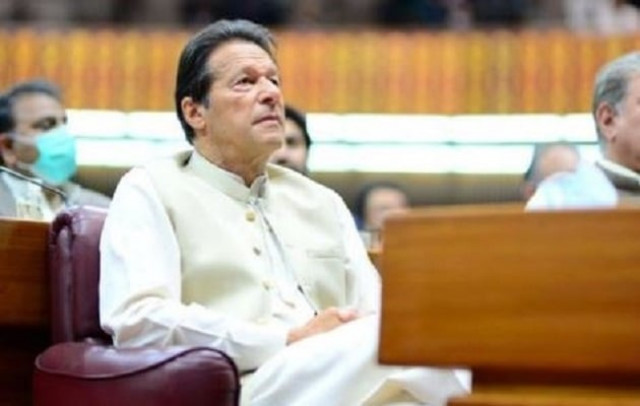PM warns of ‘revenge’ attacks for hosting US bases
Imran says Pakistan ready to be a partner for peace in Afghanistan with US

Prime Minister Imran Khan has repeated his firm stance of not providing any bases to the US, but said that Islamabad was ready to be a partner for peace in Afghanistan with Washington because both the countries wanted stability, development and denial of terrorists’ havens there.
Writing in The Washington Post, ahead of US President Joe Biden’s meeting with the top Afghan leaders at the White House later this week, Imran argued that if the US couldn’t win the war from inside Afghanistan after 20 years, how would it do it from bases in Pakistan.
The prime minister expressed the apprehension that Pakistan had already paid a very high price of instability in Afghanistan and it the country agree to host US bases, from which to bomb Afghanistan, and an Afghan civil war ensued, Pakistan would be targeted for revenge by terrorists again.
“We simply cannot afford this. We have already paid too heavy a price,” Imran wrote. “If Pakistan were to agree to host US bases, from which to bomb Afghanistan, and an Afghan civil war ensued, Pakistan would be targeted for revenge by terrorists again,” he added. “We will avoid risking further conflict.”
Imran’s opinion piece came ahead of Biden’s talks with Afghan President Ashraf Ghani and the Chairman of Afghanistan’s High Council for National Reconciliation Abdullah Abdullah on Friday to discuss US troop withdrawal amid a surge in fighting between Afghan forces and the Taliban across the country.
Imran said that Pakistan was ready to be a partner for peace in Afghanistan with the US but it would not allow the US bases on its soil, adding that Pakistan and the US had the same interest in Afghanistan—a political settlement, stability, economic development and denial of any haven for terrorists.
To sustain his contention, Imran argued that Pakistan made a mistake in the past by choosing between warring Afghan parties. Pakistan suffered so much from the wars in Afghanistan— the killing of more than 70,000 Pakistanis and $150 billion losses to the economy.
Despite this, he added: “After joining the US effort… Pakistan was targeted as a collaborator, leading to terrorism against our country from the Tehreek-e-Taliban Pakistan (TTP) and other groups,” the prime minister wrote.
He also pointed out that the US drone strikes, which he had opposed even before coming to power, did not win the war, “but they did create hatred for Americans, swelling the ranks of terrorist groups” against both the US and Pakistan.
Furthermore, he continued, the US pressured Pakistan to send troops into the semi-autonomous tribal areas bordering Afghanistan, in the false expectation that it would end the insurgency but It did not. Rather it internally displaced half the population of the tribal areas – 1 million people from North Waziristan alone, with billions of dollars of damage done and whole villages destroyed.
“I argued for years that there was no military solution in Afghanistan,” Imran wrote. “History proves that Afghanistan can never be controlled from the outside,” he added.
Read more:Pakistan’s Afghanistan challenge
Unfolding his priorities vis-a-vis Afghanistan, the prime minister made it clear that “now Islamabad has no favourites” in Afghanistan and declared that Pakistan would work with any government that enjoyed the confidence of the Afghan people.
At the same time, he added: “We oppose any military takeover of Afghanistan, which will lead only to decades of civil war, as the Taliban cannot win over the whole of the country, and yet must be included in any government for it to succeed.”
Imran emphasised that the interests of Pakistan and the US in Afghanistan were the same—a negotiated peace, not civil war. “We need stability and an end to terrorism aimed at both our countries,” the prime minister wrote.
“We support an agreement that preserves the development gains made in Afghanistan in the past two decades. And we want economic development, and increased trade and connectivity in Central Asia, to lift our economy. We will all go down the drain if there is further civil war,” he added.
“This is why we have done a lot of real diplomatic heavy lifting to bring the Taliban to the negotiating table, first with the Americans, and then with the Afghan government,” the prime minister said. “We know that if the Taliban tries to declare a military victory, it will lead to endless bloodshed.
Extended Troika
Imran expressed the hope the Afghan government would also show more flexibility in the talks, and stop blaming Pakistan because Islamabad was doing everything it could, short of military action, for a political and peaceful settlement of the Afghan conflict.
“This is also why we were part of the recent ‘Extended Troika’ joint statements, along with Russia, China and the US … declaring that any effort to impose a government by force in Kabul would be opposed by us all, and also would deprive Afghanistan access to the foreign assistance it will need,” he said.
Noting that four of Afghanistan’s neighbours and partners had spoken with one voice on what a political settlement should look like, he said Pakistan believed that promoting economic connectivity and regional trade was the key to lasting peace and security in Afghanistan.
The prime minister stressed that any further military action in Afghanistan would be futile. “If we share this responsibility, Afghanistan, once synonymous with the ‘Great Game’ and regional rivalries, could instead emerge as a model of regional cooperation.”



















COMMENTS
Comments are moderated and generally will be posted if they are on-topic and not abusive.
For more information, please see our Comments FAQ